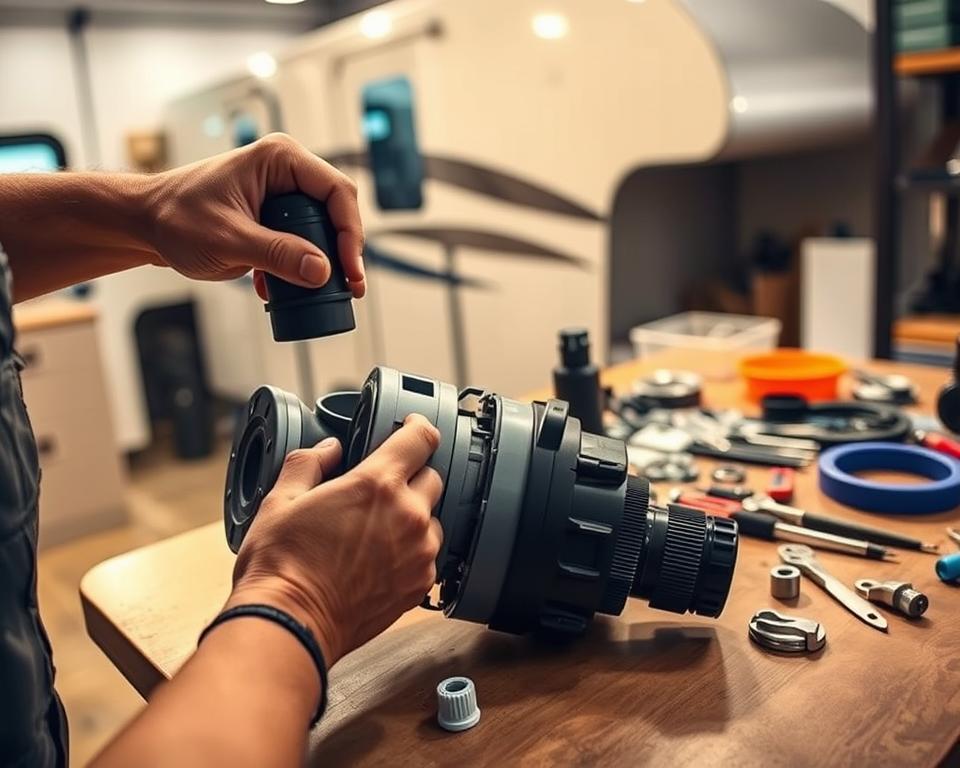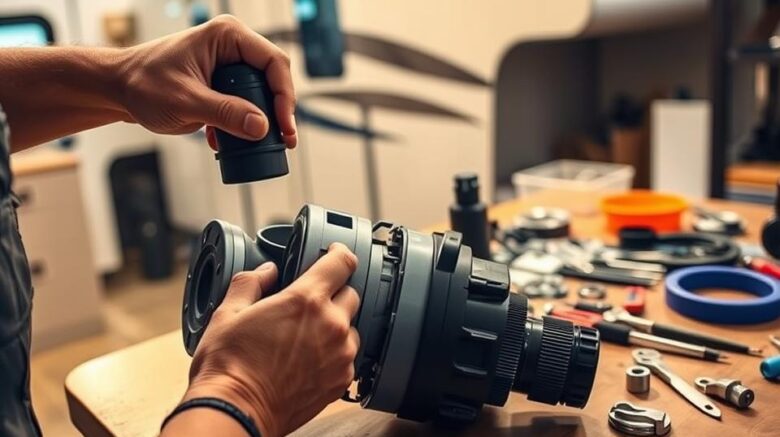Optimize Your Trip with an RV Water Pump Tank
Is your RV water system set for your next journey, or does it need improvement? A reliable RV water pump tank is essential for a good camping experience. It guarantees a consistent water flow and pressure, enhancing every part of your trip. This includes everything from cooking to cleaning.
For your RV to reach its maximum capability, upgrading the water system with RV waste pump is essential. All in Sanitation and similar brands provide excellent components that will improve your water pump system. By optimizing your RV water pump, your trips become significantly better.
The Significance of Your RV Water System
A reliable source of fresh water on your trips is provided by the RV water system. It incorporates pipes, tanks, and pumps for a reliable water supply. Maintaining these components is essential to avoid inconvenient repairs. Neglecting your RV’s water pump could result in significant costs.
Regular maintenance allows for the early discovery of issues. Filtration plays a vital role in preventing contaminants from getting into your water. Clean filters ensure the water’s safety and quality, making your journey more pleasant.

You absolutely need RV water pressure regulators to keep your system safe. By managing water pressure, these devices help protect your plumbing from damage. High pressure could cause leaks or burst pipes, posing a big problem. Pressure regulators offer assurance that your plumbing system is secure and effective.
Defining an RV Water Pump Pressure Tank
Your RV’s water system relies heavily on the RV water pump pressure tank. It makes sure the water pressure is stable, which is key for a consistent water flow all over your RV. It works to prevent sudden increases in pressure that can happen when multiple faucets are used.
A certain quantity of water is held in this tank, which works with the water pump to distribute it rapidly. As its pressure falls, the pump adds more water, ensuring your RV’s water system maintains top performance. This guarantees uninterrupted water flow, vital for an enhanced camping experience.
Accumulator tanks further improve water system efficiency. The water pump doesn’t have to turn on as often because of them. An accumulator tank can help extend the life of your pump and ensure it operates smoothly. This results in a improved travel experience.
Why You Should Have an RV Water Pump Pressure Tank
There are many advantages to installing an RV water pump pressure tank that will enhance your camping experience. Having consistent water pressure all over your RV is guaranteed by it, and this is very important. Nobody likes dealing with a weak flow during showers or while cleaning dishes. With a pressure tank, you get better water pressure, making everyday tasks more manageable.
Not only does a pressure tank offer constant pressure, but it also enhances the efficiency of the water flow. It works as a reservoir, delivering water when you need it, optimizing your system’s performance. This translates to less waiting and more enjoyment during your outdoor activities.
But it’s not just about comfort. Having a pressure tank also helps your water pump last longer. This happens because it reduces how often the pump turns on and off, which means less wear and tear. This means fewer repairs and replacements over time, saving you money.
To wrap up, adding an RV water pump pressure tank upgrades your RV experience. It makes certain that you have a stable water flow and pressure, thus improving the quality of your travels. Your adventures become more delightful and free from unnecessary stress.
Indications That Your RV Water Pump Might Need Replacement
Knowing the signs that indicate your RV water pump might need to be replaced is important. By doing so, you can prevent more serious issues with your pump later on. Key indicators include inconsistent water pressure, odd noises, visible leaks, and frequent cycling.
Inconsistent Water Pressure: Often, a pump that’s not working well will cause the water pressure to fluctuate or weaken. This is a common sign of trouble.
Unusual Noises: You should pay attention to any odd sounds coming from your pump, like grinding or rattling. They could indicate internal damage or wear.
Visible Leaks: The presence of any water around the pump indicates a problem. Compromised seals or fittings may be the culprits, suggesting a replacement is needed.
Frequent Cycling: A clear sign of issues is when the pump turns on frequently but doesn’t maintain pressure. This is a clear sign of issues.
If you act fast when you see these signs, you can stop more damage to your RV’s water system. Acting quickly ensures your water access remains uninterrupted during travels.
Tips for Troubleshooting Your RV Water Pump
Effective RV water pump troubleshooting can save both time and money when dealing with RV water system issues. Identifying common water pump problems early is crucial for a reliable water supply. Begin by looking at the hoses and fittings to check for any leaks that are easy to see. Often, a small drip can hint at a larger problem that needs quick fixing.
Inspect the water filter to make sure it’s clean and free from blockages. Low water pressure can be caused by a clogged filter, and this will impact the efficiency of the entire system. Regular maintenance of the filter ensures the system operates smoothly. Also, check the water heater bypass valve’s setting to prevent water flow issues and avoid malfunctions.
For continuous monitoring of your system, installing a pressure gauge is a smart move. It helps track the water system’s performance efficiently. When the pressure drops noticeably, it indicates that you should immediately troubleshoot any issues with your RV water system. Addressing these issues methodically can make your journey more enjoyable.
Best Ways to Maintain Your RV Water Pump for Optimal Performance
Regular upkeep of your RV water pump is vital for your vehicle’s plumbing to run smoothly. Cleaning the water filter is a critical task. A dirty filter will cause the water to flow more slowly. Therefore, you must clean it frequently to prevent blockages and make sure it works well.
It’s also very important to check your system for clogs to keep your RV’s plumbing in good condition. It helps you identify and fix problems when they are still small. It makes certain that you have a reliable supply of clean water while you are traveling.
Winterization is key to your RV water pump’s long-term health. When you’re preparing your RV for winter, make sure to empty the water system and put in antifreeze. These steps will prevent freezing and damage, ensuring your water pump is in excellent condition for your next adventure.
Installing an RV Water Pump: Step-by-Step Guide
The process of installing an RV water pump could seem intimidating. This guide simplifies the process and will give you the confidence to tackle this important DIY RV project. Start by getting your tools together and understanding how the water pump is set up.
Begin by preparing your workspace. Make sure to have these tools at the ready:
With all the necessary tools collected, follow these steps to ensure a successful installation:
During the process, watch for common mistakes. Check that all connections are secure so you don’t have leaks later. Make sure there’s enough space around the pump so it can work efficiently and maintenance will be simpler in the future.
Your water system’s efficiency will be improved, and you’ll feel more confident in doing DIY RV tasks after you finish installing your RV water pump. Feel a sense of accomplishment knowing you’ve successfully installed it.
Improving Your RV Water Pump for Better Performance
Switching to a high-flow water pump can hugely improve your RV’s water system performance. Such an upgrade not only bumps up water pressure but also the flow volume. This ensures a better and more efficient experience when using your RV’s amenities.
Look for reputable brands like ‘All in Sanitation’ when you’re ready to upgrade. If you choose a model that’s known to be reliable, you’re investing in how well your RV works. You’ll get durability and increased efficiency for the future.
Keep these points in mind as you explore what’s available:
Here’s a brief comparison of some top models:
If you pick the correct RV water pump upgrade, you can significantly improve both efficiency and comfort. Assess the available models carefully. Then, contemplate how they align with your lifestyle on the road.
Your RV’s water system’s success is greatly influenced by how well the RV water pump pressure tank performs. Understanding its importance is key to effective management of your water supply. This ensures dependable water access throughout your travels. Regular maintenance and quick issue resolution prolong your system’s life, smoothing out your adventures.
You should also update your equipment if you want a better RV experience. Because of technological advancements, newer RV water pumps offer better reliability. They offer enhanced performance, granting you peace of mind while on the move. Adding these improvements significantly improves your satisfaction while traveling.
Following the advice in this text will help you keep your RV water system running smoothly. Remember the crucial role that a well-maintained RV water pump pressure tank plays as you embark on new adventures. It forms the basis for a pleasant and fulfilling journey.
